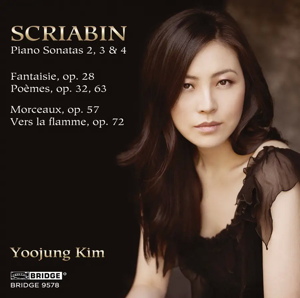
Alexander Scriabin (1871-1915)
Fantaisie in B minor Op.28 (1900-1901)
Piano Sonata No.2 in G sharp minor Op.19 (1892-1897)
Piano Sonata No.3 in F sharp minor Op.23 (1897-1898)
Piano Sonata No.4 in F sharp major Op.30 (1901-1903)
Deux Poèmes Op.32 (1903)
Deux Morceaux Op.57 (1908)
Deux Poèmes Op.63 (1911-1912)
Vers la flamme Op.72 (1914)
Yoojung Kim (piano)
rec. 2019, Concert Hall, Drew University, Madison, New Jersey, USA
Bridge Records 9578 [69]
Yoojung Kim’s Scriabin recital concentrates on the earlier piano sonatas with just a sprinkling of his later mature works. The fourth sonata and the op.32 poèmes are reaching towards the harmonies he used in his later works but as the decisive F sharp major ending of op.30 shows he wasn’t quite ready in 1903 to take that final step, leaving it to the fifth sonata to forge that path.
The recital opens with Scriabin’s wonderful Fantaisie. Wonderful in my opinion but it lived neither in the fingers nor even memory of its composer who failed to recognise it when Leonid Sabaneyev played him an excerpt. For all its strongly chromatic harmony it is an outrageously romantic work that seems to be full of climaxes and Ms Kim’s gifts are well displayed right from the start; impeccable technique, marvellously graded dynamics and well judged balance of voicing, such a necessity in Scriabin’s music. She handles the almost improvisatory nature of the second sonata assuredly but I am more impressed with the third and fourth sonatas with their increasingly tortuous voice writing, a dense web that holds no fears for Kim. Her attention to detail is impressive and the slow movement of the third with its delicate decorative tracery is particularly attractive. The compact fourth sonata seems to especially suit her from its breathless pianissimo passages, bars that Scriabin peppers through the movement with dolcissimo, quietissimo and calmando markings, to its dam-breaking and jubilant fff final outburst.
After the sonatas Ms Kim turns to some of the shorter works, the poèmes, to which Scriabin was so devoted. The first of the op.32 poèmes is relatively familiar and was a favourite of Vladimir Horowitz. Its perfumed harmony is not yet the enigmatic sound of op.57 or op.63 but is still enough to give an air of the exotic to this little romance. The calm is dashed by the harsh entry of the second poème but even here the mood quickly becomes more heroic than brutal. The harmonic palette is completely different by the op.63 poèmes, enigmatic regarding key but with a sure progression that hints of and dances around a tonal centre. Kim is evocative here especially in the skittish arpeggios of op.63 no.2. Closely tied to these are the two pieces op.57; Désir, a desire left unsatisfied and caresse dansée, a wonderfully modern take on a late 19th century waltz and, rather unexpectedly, ending on a resolved and satisfying C major chord. The recital ends with Vers la flamme, Scriabin’s vision of the conflagration toward which the world is headed, its slowly developing drama and urgency a far cry from the earlier works. Kim conveys the struggle very effectively and if she is missing that last snarl of terror in the tremolos I find that that is due in part to the rather low treble and somewhat full bloom in the sound; wonderful though that is for all those many, many bass octaves it just takes the edge off here. Still this is a wonderful recital, very well executed by this talented New York based Korean pianist.
Rob Challinor
Buying this recording via a link below generates revenue for MWI, which helps the site remain free.




















